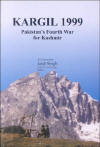|
| Home | About Kashmir Herald | |
Volume 2, No. 2 - July 2002 |
|
|
|
The Magic of Autonomy Editorial Team In recent weeks, the drumbeat of "greater autonomy" for Jammu and Kashmir has migrated from the many editorials, op-eds and analyses in Indian media to the editorial pages of major news outlets of the United States. One recent Indian op-ed even resurrected a statement by a long-retired politician who had promised that "the sky was the limit for J&K autonomy". Last week, PM Vajpayee himself hinted that additional autonomy was being considered for the state. Of all these write-ups and comments, none has suggested where or how greater autonomy would fit into a comprehensive roadmap for peace in the state. Furthermore, none of these articles discuss the pre-existing autonomy that the state has already enjoyed over the last five decades under Article 370 of the Indian Constitution. And more importantly, nowhere do these articles explore the strong correlations and links between various aspects of autonomy that the state was granted, and its various woes since independence. Under Article 370, Indian
laws on corruption and penal code were not applicable to Jammu and
Kashmir. The state's bureaucracy and political leadership abused this
situation to their benefit and to the detriment of the common resident of
J&K. Thus while India pumped up to 14 times more financial aid to the
state, compared to other states, the largesse never found its way down to
the economically deprived. The provisions of Article 370 were also The "autonomy" under Article 370 was also used by Kashmiri Muslims, who form a minority in the state, to establish political and economic hegemony over residents of Jammu and Ladakh, as well as the Hindu and Sikh residents of Kashmir valley itself. A disproportionate scarcity of political representation, job and educational opportunities became increasingly evident for those who were not Kashmiri Muslims, driving many of them to emigrate from the state to other parts of India. The resultant decrease in the non-Muslim population of the state contributed to a vicious cycle, which fueled by the rampant corruption and lack of economic opportunities, made the state a fertile ground for Taliban-style fundamentalism exported from Pakistan. If autonomy has been
misused to such an extent in the state and resulted in its economic and
social decay and contributed towards it becoming the nuclear flashpoint of
the world, why would greater autonomy result in a more suitable outcome?
This question is what needs to be asked by all those that are blindly
following the magical road of "greater autonomy". Wouldn't closer
integration with the rest of India, resulting in rapid economic progress
and |
 |
 |
 |
|
|
Archives
| Privacy Policy |
Copyrights
|
Contact
Us | |
||